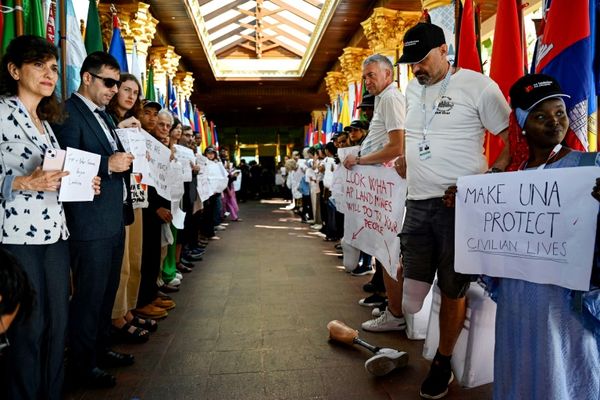
As the security situation in the Sahel continues to deteriorate, the causes of escalating violence are discussed regularly, but no one is taking appropriate action to counter it.
The U.S. Department of State routinely emphasizes the role of transnational terrorist groups, such as al Qaeda and the Islamic State, in triggering the Sahel’s security crisis. Reports from development agencies and think tanks regularly highlight fragile state institutions, authoritarianism, and climate change as factors that cause instability. Still, policymakers vacillate on whether to devote resources to counterterrorism efforts or to development initiatives.
In spite of these intense debates, one vital contributor to insecurity in the Sahel is often ignored: the crisis of international governance. Instead of taking constructive steps to address the array of challenges facing the Sahel, great powers and regional institutions are exacerbating the region’s problems.
Due to their intense focus on geostrategic competition and willingness to equate authoritarianism with stability, great powers such as France, the United States, Russia, and China, have actually perpetuated conditions, such as corruption and fragile state institutions, that contribute to rising political violence in the Sahel. Regional institutions such as the African Union and the Economic Community of West African States (ECOWAS) have exacerbated the governance crisis because of a lack of strategic coordination and their inefficient use of military resources.
Although great-power competition in the Sahel has intensified in recent years, France remains the region’s dominant security provider. In January 2013, France responded to an official Malian government request for assistance by launching Operation Serval—a counterterrorism intervention that halted the advance of Islamic extremist militants from northern to central Mali. In August 2014, France and the G-5 Sahel countries (Burkina Faso, Chad, Mali, Mauritania, and Niger) embarked on a regionwide counterterrorism campaign called Operation Barkhane.
A French strike on June 3 this year killed Abdelmalek Droukdel, the leader of al Qaeda in the Islamic Maghreb. France has also cooperated militarily with the U.N. peacekeeping mission in Mali. This mission deploys up to 13,289 soldiers and 1,920 police officers to the Sahel and monitors human rights abuses perpetrated by armed groups in the region.
Despite these military successes, France’s approach to counterterrorism in the Sahel has also exacerbated the region’s security crisis. Although French military operations rely on U.S. intelligence and logistical support from some 800 U.S. personnel deployed in Niger, France’s preference for unilateralism in West Africa has restricted its ability to work with Washington on developing a regional security strategy. In 2017, France initiated a U.N. motion calling for a 5,000-man African security force to be deployed to the Sahel but rankled U.S. officials by apparently not consulting with them on its plans.
The adverse consequences of French unilateralism have become apparent in recent months. The expansion of political violence in the Sahel, in spite of the increase of the French military presence from 4,500 to 5,100 forces in February, underscores France’s inability to resolve the Sahel security crisis on its own and increases the risk of French military overextension in West Africa.
France’s 5,100-troop military contingent in the Sahel is dispersed across Mali, Chad, Niger, Burkina Faso, and Mauritania, and the French military has also stationed 1,000 troops in Ivory Coast to assist its struggle against Islamic extremism, In addition, France’s resolute support for authoritarian leaders in the region, such as Chadian President Idriss Déby, falsely conflates autocracy with stability and plants the seeds of discontent that fosters extremism in the region.
The wavering commitment of the United States to stabilizing the Sahel has exacerbated France’s overextension and reduced the international community’s ability to combat extremism in West Africa. In spite of bipartisan opposition and strenuous objections from French Defense Minister Florence Parly, U.S. Secretary of Defense Mark Esper hinted strongly on Jan. 27 at a drawdown of U.S. counterterrorism forces in the Sahel region.
In April, the Pentagon reduced access to medical evacuation flights for U.S. troops fighting in West Africa. U.S. officials also have a skeptical view of the U.N. peacekeeping mission in Mali, even though it has served as a partial check on political violence in the country’s central regions. This dismissive attitude has placed the administration of U.S. President Donald Trump on a collision course with France at a time when increased cooperation is essential.
Although France’s unilateralism and the United States’ disengagement have been the most significant contributors to the crisis of security governance in the Sahel, Russia and China’s approaches to regional security have also worsened this problem. Russia’s permissive approach to arms contracts in West Africa reinforces France’s efforts to make autocracy the antidote to extremism. Russia’s military cooperation agreements with Burkina Faso, Chad, Niger and Mali pay no heed to the human rights situation there, and Moscow has supported Guinean President Alpha Condé in spite of crackdowns on peaceful protesters.
Russia’s June 2019 military cooperation agreement with Mali might have resulted in the training of Malian militants involved in the Aug. 18 coup, but there are also reports that the U.S. government trained the coup plotters in Mali. As for Beijing, in spite of its desire to extend the Belt and Road Initiative into the Sahel, China has only offered ambiguous rhetorical solidarity with the G-5 bloc’s counterterrorism goals.
Even though the inability of great powers to develop a coordinated Sahel security strategy has inspired calls to “solve African problems in African ways,” regional institutions have not stepped up to the challenge. On Feb. 27, the African Union announced a pledge to deploy 3,000 troops to the Sahel, but South Africa’s Ambassador to the AU, Edward Xolisa Makaya, subsequently stated that no countries had offered to volunteer troops and it remained unclear how this African Union operation would be financed.
Many observers have criticized the African Union for not deploying the African Standby Force to the Sahel, as some of its member states prefer ad hoc rather than longer-term deployments. (The force, which specializes in peacekeeping operations, was declared operationally ready in 2016, and its presence could centralize the Sahel security initiatives advanced by the African Union in recent years.)
ECOWAS’s response to the Sahel’s security crisis has been similarly marred by strategic incoherence. Instead of devising a coherent vision to combat insurgencies in the Sahel, ECOWAS has outsourced its security responsibilities to initiatives such as the G-5 bloc and the Multinational Joint Task Force, which seeks to stabilize the Lake Chad region.
Because of its abdication of responsibility, ECOWAS’s pledge to spend $1 billion on Sahel security from 2020 to 2024 has been thinly spread and left individual counterterrorism initiatives short of funds. ECOWAS’s failure to mitigate Mali’s ongoing political crisis has further undercut its credibility as a security provider in the Sahel. After ECOWAS leaders convened for negotiations in Bamako on July 23, Mahmoud Dicko, the leader of Mali’s opposition June 5 Movement, declared that no progress had been made in the talks. ECOWAS’s threat to impose sanctions on Malian political factions that disrupt a peace settlement also did not deter the coup.
Although a comprehensive resolution of the security governance crisis in the Sahel is unlikely to occur soon, there are constructive steps leaders can take immediately. The United States and France should emphasize great-power cooperation; Washington should cease its efforts to undermine the U.N. peacekeeping mission in Mali; and the United States should materially aid France’s efforts to defeat Jamaat Nasr al-Islam wal Muslimin, an al Qaeda partner in Mali, instead of merely seeking to contain its growth.
As the United States and China are both concerned about transnational terrorism originating from the Sahel, they can use the Mali crisis as a rare opportunity to find common ground. France should refrain from uncritically supporting authoritarian regimes in the Sahel, encourage its European partners to contribute counterterrorism forces to the region, and address West African security in its strategic dialogue with Russia.
In order to reduce fears of neocolonialism in the Sahel and avoid the backlash that resulted from unilateral U.S. counterterrorism operations in Somalia, great-power consultations must be paired with regional engagement. International financial assistance can bolster the efficacy of the G-5 bloc and other initiatives that have supplanted ECOWAS while permanent U.N. Security Council member states could support regional efforts to mediate regional crises.
Great powers should also support initiatives like Morocco’s mediation during the Mali crisis and Algeria’s periodic arbitration efforts in the Sahel. Finally, as weaponry used during the 2011 Libyan civil war exacerbated the crisis in Mali from 2012 to 2013 and Sahel security hinges on stability in North Africa, the United States should assume a more active diplomatic role in Libya.
As the spread of political violence in West Africa enters its fifth year and Mali’s political future hangs in the balance, great powers and regional actors must address the crisis of security and governance in the Sahel rather than coddling authoritarians in pursuit of stability and myopically pursuing their own narrow geostrategic goals.






